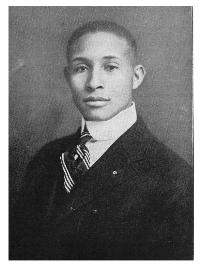

The Fergusons moved from Virginia to West Virginia when the son was only a year old. So it was in the schools of West Virginia that he laid the foundation of his education, first going to the public schools of Raymond City, and later to the Garnet High School at Charleston. From the high school he passed to the West Virginia Collegiate Institute, with which, some years later, he was to be identified as a teacher. Here he came under the influence of that pioneer teacher Prof. Byrd Prillerman, who exerted on the life of the youth then and later a most wholesome influence. His parents, too, were ambitious for him and rendered every assistance in their power.
After his graduation from the Collegiate Institute in 1909, Prof. Ferguson taught for three years in the Fayette County schools. With the money thus earned, he matriculated at the Ohio State University, Columbus, Ohio, where he had a brilliant career as a student and broke many records. He won his Bachelor of Science degree in 1916 and the following year the Master of Science degree. He was elected, and by an unprecedented majority, class orator at the 1916, a distinction not hitherto accorded a Negro student. He was active and prominent in college fraternities and societies and in athletics. He was identified with the Kappa Chapter of the Alpha Phi Alpha Greek letter fraternity, New Students League and Ohio State Jubilee Singers. He served all three of these organizations as president. He was one of two Negro members of the Y. M. C. A. Varsity "O" Association, and the only Negro member of the Cross Country Club. Prof. Ferguson also belonged to the International Cosmopolitan Club and was member of the varsity track team and of the Cross Country Team 1914-1916, inclusive. He was regarded as an all-around athlete, and was the first Negro student at the institution to earn his official letter in athletics. He holds Conference records in indoor half mile, one mile, four mile, and one mile relay.
That he did not permit his athletics to interfere with his studies, is evidenced by the record already cited.
After graduation from the University, he was on July 1, 1917, appointed teacher in the College of Liberal Arts and Sciences, West Virginia Collegiate Institute, Institute, W. Va., and Extension Agent for the same institution.
After teaching two months, he secured leave of absence to enter the U. S. Army and enlisted as a private October 30, 1917, in Engineer's Training Battallion, Camp Lee, Virginia. Because of the existing prejudice and discrimination against Negro soldiers at Camp Lee, Prof. Ferguson interested a number of the leaders of both races in the situation. The took the matter up with the Washington authorities, and effected a transfer, of those who desired it, to other camps where more favorable treatment was accorded. He was promoted Corporal and transferred to Camp Grant, Ill., where a brother, Capt. G. E. Ferguson was in command of Co. M., 365th infantry. Prof. Ferguson was assigned to Co. F of the same regiment and later transferred to Fourth Officers Training School, Camp Dodge, Iowa. Here he qualified for Machine Gun Training School and was sent to Camp Hancock, Ga., and was trained and received his certificate as instructor. On September 15, 1918, he was commissioned 2nd Lieut., graduating with honors at the head of his class with the highest general average in work and theory. He was put in command of 84th Company, 7th Group, M. T. D., which position he held till he was discharged from the service on Jan. 6, 1919.
Returning to the Collegiate Institute, he resumed his work there occupying the chair of Economics and Sociology and serving as Dean of College. He is now (1922) Professor of Sociology in the Collegiate Institute and Special Extension Agent for both the Institute and West Virginia University.
He says, "The greatest factors in shaping my life have been my constant recourse to the Bible, my earnest application of Christian ideals, and a disposition to follow the guidance of a devoted father and a loving mother." "My biography," he continues, "would not be complete, if I failed to mention Dr. Byrd Prillerman (a story of whose life appears elsewhere in this work) after whom I have shaped my life and who has, as a father would to his children, given me timely advice and pointed my way."
On January 2, 1918, Prof. Ferguson was married to Miss Katherine Watson Stewart, daughter of Joseph A. and Janie L. Stewart. They have two children, Jane Elizabeth and Daniel Le Roy Ferguson, Jr. Mrs. Ferguson was educated at Columbus, Ohio.
Prof. Ferguson is an active member of the Baptist church. He is superintendent of his local S. S. and also of the S. S. conducted at the Collegiate Institute. He is a thirty-second degree Mason and a Shriner. In politics he is a Republican. His favorite reading after the Bible consists of history and biography.
He believes that the progress of the race is to be promoted. "By adopting a thorough system of education, designed to meet the specific needs of the race. Such a system as will lead to industrial and economic independence upon which a higher cultural state can be built. The Negro should learn that it is far better to have the say as to who shall enter his industries, than to remain on the outside of the other fellow's with hat in hand, seeking admission. Such a system of education could not well omit altruism, cooperation and organization as fundamental basic elements. The latter would give us not so many race leaders but more race representatives."